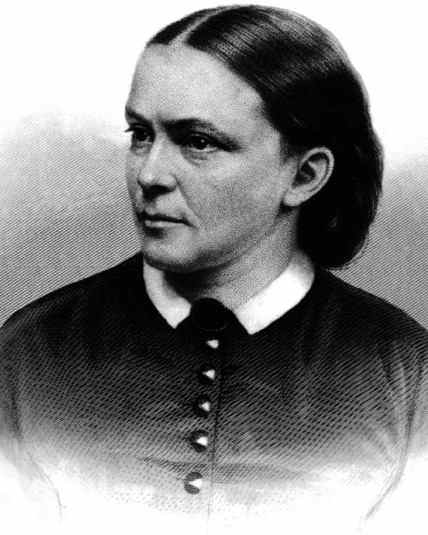Cordelia Harvey - Wisconsin’s Angel
Born: December 27, 1824, Barre, New York, U.S.A.
Died: February 27, 1895, Clinton, Wisconsin, U.S.A.
Cordelia Harvey, Wisconsin’s First Lady for only 94 days, devoted her life to helping wounded soldiers and orphans during and after the Civil War.
Cordelia Adelaide Perrine Harvey was born in upstate New York in 1824. When she was sixteen, her family moved to Kenosha, Wisconsin, which was still a young frontier town. As she grew up, Cordelia became a schoolteacher. Teaching was one of the few careers open to women in the 1800s, and it showed her patience, discipline, and care for others, skills she would later use in much greater ways.
In 1847, Cordelia married Louis P. Harvey, a fellow teacher. Together, they moved around Wisconsin, running a store and becoming active in politics. By 1859, Louis was elected Secretary of State, and in 1861 he rose even higher, becoming governor of Wisconsin just as the Civil War was beginning. Cordelia became the First Lady of the state in January 1862.
Her time in that role was heartbreakingly short. Only 94 days later, Governor Harvey drowned while traveling to Tennessee to visit wounded Wisconsin soldiers after the bloody Battle of Shiloh. Devastated but determined to carry on her husband’s work, Cordelia chose not to retreat into private life. Instead, she stepped forward, becoming one of the most important women in Wisconsin’s Civil War story.
Cordelia was appointed Wisconsin’s official “state sanitary agent.” This meant she was responsible for checking on soldiers’ health, delivering supplies, and reporting on conditions in hospitals. Civil War hospitals were often terrible places. They were overcrowded, dirty, and lacking enough doctors or nurses. Soldiers were just as likely to die from disease as from bullets. Many lay outside in tents, with little food or clean clothing.
Cordelia did not let this stop her. She wrote to Wisconsin’s governor asking for more doctors and nurses. She encouraged women back home to send food, blankets, and clothing. Most importantly, she visited the soldiers herself. Wearing her black hooded cape, she walked from cot to cot, bringing gifts, reading letters, and offering comfort. Soldiers soon recognized her and began to call her the “Wisconsin Angel.” She even showed compassion to Confederate prisoners, believing that mercy should have no boundaries.
As she worked, Cordelia realized that soldiers would heal faster if they were cared for away from the hot, swampy Southern climate. She believed hospitals should be built in Wisconsin, where soldiers could rest closer to home. Many officials resisted the idea, fearing soldiers would desert if sent north. In 1863, Cordelia traveled to Washington, D.C., to make her case directly to President Abraham Lincoln. At first, Lincoln was doubtful. But Cordelia refused to give up. With her quiet determination, she finally convinced him. Soon, three hospitals were built in Wisconsin, one in Madison, one in Milwaukee, and one in Prairie du Chien.
These hospitals not only saved lives during the war, but after it ended, they served another purpose. Cordelia helped turn them into orphanages for the children of fallen soldiers. As superintendent, she cared for hundreds of children who had nowhere else to go. Nearly 700 boys and girls lived in the Madison Soldiers’ Orphans Home in the decade following the war. She welcomed children regardless of whether their fathers had fought for the Union or the Confederacy, showing her deep compassion and sense of justice.
In later years, Cordelia married Reverend Albert T. Chester and moved to Buffalo, New York, where she taught school until his death. She eventually returned to Wisconsin, where she lived quietly until her own death in 1895 at the age of 70. She was buried next to her first husband, Louis, in Madison’s Forest Hill Cemetery.
Cordelia Harvey’s life was marked by service, courage, and perseverance. She could have chosen to grieve in private after losing her husband, but instead she devoted herself to the welfare of soldiers and their families. Her work saved countless lives, comforted the suffering, and cared for the most vulnerable. Remembered as “Wisconsin’s Angel,” she once said, “I would not exchange the memory of their grateful faces and their heartfelt ‘God bless you’s’ for anything in this world.”
Cordelia Harvey’s legacy reminds us that compassion and determination can bring light even in the darkest times.
References:
Bray, Robert C. “The Cordelia Harvey Manuscript: ‘Reflections of hospital life, and personal interviews with president Lincoln.’ part I.” Journal of the Abraham Lincoln Association, vol. 43, no. 1, 2022, pp. 71–92, https://doi.org/10.3998/jala.2755.
Bray, Robert C. “The Cordelia Harvey Manuscript: ‘Reflections of hospital life, and personal interviews with president Lincoln.’ part II.” Journal of the Abraham Lincoln Association, vol. 43, no. 2, 2022, pp. 36–61, doi.org/10.3998/jala.4057.
“Cordelia Harvey.” Wisconsin Historical Society, 19 Dec. 2014, www.wisconsinhistory.org/Records/Article/CS4370.
McKinney, Mrs. William. “Mrs. Cordelia A. P. Harvey.” UWDC Search - UW-Madison Libraries, UW-Madison General Library System Digital Production Facility, 1 Jan. 1998, digicoll.library.wisc.edu/WIReader/WER0108.html.
Keywords:
Justice, Wartime, Courage, Perseverance, Responsibility, Selflessness, Challenge Injustices, Make a Difference
Explore ARTEFFECT projects about this Unsung Hero:
Cordelia Harvey Artworks

